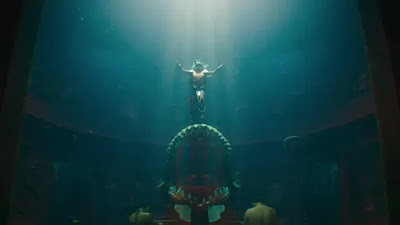Black Panther: Wakanda Forever
If Black Panther: Wakanda Forever comes across as an odd hybrid of an emotional tear jerker and a bombastic Marvel spectacle, you can't really blame co-writer and director Ryan Coogler. After the tragic loss of his original star, Chadwick Boseman, to colon cancer two years ago, he was forced to rewrite the film as a moving tribute, as well as for a way for the character's legacy and the Marvel Cinematic Universe itself to carry on.The end result can be a bit messy at times, but tremendously engaging, and probably the most heartfelt film to come out of the Marvel Studio. Boseman is still very much a presence, and the grief over losing both the actor and the character he played drives the plot. This is evident in how many of the returning characters from the 2018 film handle the passing of King T'Challa. His sister, Shuri (Letitia Wright) is angry over not being able to save him from illness, despite the technology at her command, and takes refuge in her work, hiding herself away in her lab. Her mother, Ramonda (Angela Bassett), is clearly at a loss, but must appear strong before her people, and turns to traditions and her spiritual faith.This is the most engaging aspect of the film, and Coogler handles it with the sort of maturity we seldom see in blockbuster entertainment. The loss of its star has forced the film to focus on the supporting cast, and give them various and sometimes conflicting ways to honor the memory of T'Challa. In particular, in stepping up into a lead role, Letitia Wright gives her character tremendous depth and emotional range. The result of seeing these characters and how they have changed from the last time we saw them four years ago feels natural, and has been drawn with plenty of character growth, and opportunity for the returning cast to bring new levels to their performances that perhaps were not there previously. In particular, Angela Bassett brings heartbreaking power as a woman who has lost her son, yet must appear strong in the public eye.Naturally, a new threat has to rise as well, in the form of a race of aquatic beings who hail from the undersea kingdom of Talokan. Led by Namor (Tenoch Huerta), they are pitted against Wakanda in a war that may eventually involve the entire surface world should things continue to escalate. The introduction of this new society is intriguing, and certainly handled with more dignity than in the Aquaman film. (No bongo-playing octopus here.) The script makes Namor into an intriguing antagonist, as we can sense a kind of truth behind his beliefs, and the events that shaped him when we learn of his past. Marvel is obviously laying into place his position in the grand overall Universe, and the magnetic performance Huerta gives here makes me want to see more sooner rather than later.With its world-shattering stakes, intimate personal moments, and standard elements designed to move the entire Cinematic World forward, Wakanda Forever can seem a bit frantic, especially during an extremely busy final act that is ambitious, but a bit jumbled in terms of special effects. However, I found a lot more to praise here. The production design is first rate, especially the design of the underwater world, and we have been given richer characters than before. Despite the passing of Boseman, his presence and his influence is felt throughout, creating probably one of the more emotionally resonant entries I can think of in all the Marvel films.
It's common for a franchise to pay tribute to one of its lead influences, but it's seldom that we get such an overpowering sense of emotion, love, and clarity that this film provides. I have no doubt that not just this series, but the Marvel Timeline in general, will continue to honor him, and that the contributions of Boseman and his character will continue to be felt. That is the rare and undeniable power of this movie.












0 Comments:
Post a Comment
<< Home